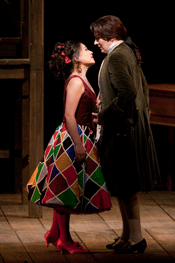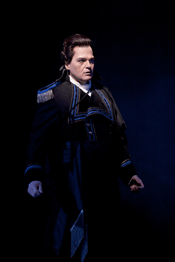Kyrill Petrenko bringing out all the
elegant, edgy Schwarmerei of a score that is supremely sophisticated
without being too sophisticated to believe in fanciful dreams, and the
production, for once in a long while, was a production of the opera being
performed, so that all the parts fit together instead of sticking out like
bleeding, inefficiently amputated limbs. All was bliss. I can’t remember
the last time I so thoroughly enjoyed being at the Met.
You remember the colorful Elijah Moshinsky production, with its vertiginous
three-story farthingales on the earth spirits, its rather overdone acrobatics,
its sky map giving way to shipscape giving way to setting (or is it rising?)
sun? Well it’s as charming as ever. Laurie Feldman’s redirection
has no doubt been hampered by having a cast of comparatively slim singers for
once — her Brighella, has to wear a false tummy to live up to
commedia expectations — but all were game, and the clowns tossed
Zerbinetta about in the air in mid-roulade without hampering her breath
control. (Diana Damrau, over in La Fille du RÈgiment, take notice.)
 Kathleen Kim as Zerbinetta and Sarah Connolly as the Composer
Kathleen Kim as Zerbinetta and Sarah Connolly as the Composer
Sarah Connolly, who sang the Composer radiantly, is not a pretty woman, and
she makes her looks work for her in her frequent assumption of trouser roles
(Giulio Cesare, Romeo, Ariodante). As a lover, she is sometimes less than
convincing, but she was irresistibly right this time for the adolescent,
idealistic musician, Strauss’s tribute to his beloved Mozart:
clumsy-charming and visibly a-quiver when a seated Zerbinetta casually leaned
on his knee. Connolly sang the little air to Cupid and the fervent hymn to
Music (the two gods, one might say, who preside over this opera) with a fervent
delight that reminded more than one listener of Troyanos and was certainly the
most enthralling account of the part to be heard at the Met since her day.
 Lance Ryan as Bacchus
Lance Ryan as Bacchus
I think I’ve never heard a bad Zerbinetta — they’re either
good or terrific in my experience, which goes back to Reri Grist — and
Kathleen Kim (if not quite Swenson or Dessay) was on the terrific end of the
spectrum. She is one of the tiny Zerbinettas (a group including Grist
and Dessay), and she makes use of her size and agility to boss big
folks to great comic effect. Her bewitchment of the hapless Composer is quite
believable. In the early scenes her trills were on the colorless side, but all
was in place by the time her “Grossm‰chtige Prinzessin” began. In
that bravura number, where the cascades of ornament can often lack color, she
made the notes identifiable notes and brought down the house.
Nina Stemme is too rare a visitor on these shores, as the great dramatic
German roles are currently in disfavor here or tend to be performed by
second-rate Americans. She sang Ariadne with torrents of earth-deep sound in
colors of cognac and sherry, rising to superb heights, rich with frustrated
— and then idealized — emotion. She is also as slim as any lover of
the opera could desire, and plays a glamorous send-up of a diva.
The trio of “earth-spirits” were charming — and in the
higher reaches of the house, I’m told, blended with unusual delicacy.
Though all very decent, the men were not quite so fine as the women in the
cast. This is not a tragedy in Strauss, who would have done without male voices
entirely if he’d been permitted to do so. Lance Ryan sang the high-lying
role of Bacchus without a squall or a crack, in itself an achievement, but with
a dryish color that did not always give pleasure. Jochen Schmeckenbecher sang
an admirable Music-Master, and the comedians were ably handled by Markus Werba
as Harlekin — one has heard more sensuous serenades — Mark
Schowalter, Joshua Bloom and Sean Panikkar. In this staging, Scaramuccio and
Truffaldino have very little to do and no distinction, but Panikkar gave
Brighella a distinctive sound and antics.
Michael Devlin — surely not the man I heard sing Ptolemy to
Sills’s Cleopatra forty years ago! And the Count to Te Kanawa’s
Countess thirty years ago! But yes, it was he — performed the speaking
role of the Major-Domo with archducal hauteur, a man so snooty he regards
singing in an opera as beneath his dignity.
Kyrill Petrenko demonstrated clarity and genuine feeling for Strauss’s
mingling of delirious motifs, and produced not just a musical fabric but a
philosophic statement. The singers all found him easy to work with — they
went about their comical antics without appearing to pay him any attention, but
they were always together and he was always having fun. So were we.
John Yohalem
image=http://www.operatoday.com/ARIADNE_Stemme_as_Ariadne_1.gif
image_description=Nina Stemme as Ariadne [Photo: Marty Sohl/Metropolitan Opera]
product=yes
product_title=Richard Strauss: Ariadne auf Naxos
product_by=Ariadne: Nina Stemme; Zerbinetta: Kathleen Kim; Composer: Sarah Connolly; Najade: Anne-Carolyn Bird; Dryade: Tamara Mumford; Echo: Erin Morley; Bacchus: Lance Ryan; Music Master: Jochen Schmeckenbecher; Harlekin: Markus Werba; Brighella: Sean Panikkar; Scaramuccio: Mark Schowalter; Truffaldino: Joshua Bloom. Production by Elijah Moshinsky. Chorus and orchestra of the Metropolitan Opera, conducted by Kyrill Petrenko. Performance of February 15.
product_id=Above: Nina Stemme as Ariadne
All photos by Marty Sohl/Metropolitan Opera